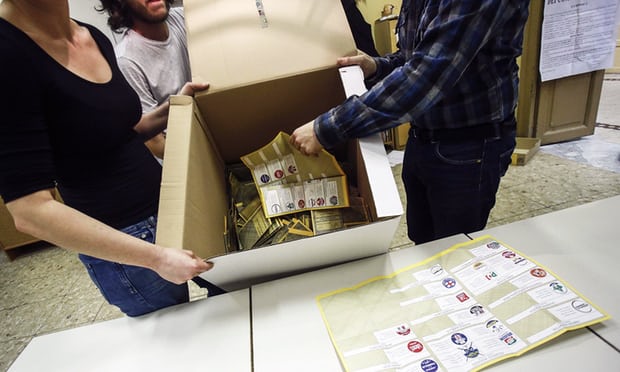Two months after inconclusive elections in March led to political deadlock, president Sergio Mattarella has called for a fresh round of consultations in a last-ditch attempt to get the parties to agree a deal to form a government.
On Monday, the three main political forces will have just one day to cast aside their differences and come up with a solution after two exploratory mandates failed to yield results.
The 4 March result saw a coalition led by the League (La Lega), a far-right party, win the biggest share of the vote – 37% – and the populist Five Star Movement (M5S) emerge as the biggest single party with 33%. The deeply divided centre-left Democratic party had its worst-ever performance with only 18%.
After a promising start, relations between Matteo Salvini, leader of the League, and M5S’s Luigi Di Maio soured over the latter’s insistence that Salvini abandon his coalition partner, Italy’s disgraced former prime minister Silvio Berlusconi.
Meanwhile talks between arch rivals M5S and the Democratic party were scotched after another former prime minister, Matteo Renzi, who still holds considerable power over the party, said he would not back a government led by M5S. The Democratic party, currently headed by caretaker leader Maurizio Martina, met on Thursday to decide whether or not to pursue formal negotiations with M5S. But Renzi’s stance is likely to hold sway.
“There is a brutal struggle for power and I think Renzi will win – he’s in control of the party but, at the same time, this is the first time there has been a real revolt against him,” said Mattia Diletti, a politics professor at Sapienza University in Rome.
“At the same time, Mattarella is asking for responsibility and there is a side of the Democratic party that is sensitive to what the president says and afraid of being in opposition. If there is space to move, they would prefer to be in government.”
If Monday’s talks fail, then Mattarella is likely to seek a transitional government, potentially handpicking a leader, that would deal with matters such as approving the 2019 budget before new elections are held.
Di Maio is pushing for an immediate re-vote, while Salvini, whose party has strengthened in polls since March, is said to favour a ballot towards the end of the year.
The pair’s conflict over timing can be better understood by the outcome of last Sunday’s regional elections in the northern Friuli-Venezia Giulia, where League candidate Massimiliano Fedriga, backed by the same coalition vying for national government, took almost 60% of the vote. The victory ousted a centre-left leadership and left M5S trailing behind in third place with just 12.6%. A vote in the central region of Molise in late April also saw the Forza Italia candidate within the coalition take the helm, while support for M5S dwindled.
Advertisement
Many Italians are unimpressed with the latest period of political paralysis gripping their country. “We are fed up and I don’t want to have another vote,” said Marina Mari, who voted for M5S in the March elections.
“It would be a huge waste of money to hold another election. I trust Mattarella, but not the rest. But if the outcome on Monday means a government between M5S and the League, then at least it’s something.”
Diletti envisages a national ballot being held in December, with the bolstered League enabling the centre-right alliance to reach the 40% majority required to govern. Such an outcome would pave the way for Salvini, who for the most part has campaigned on an anti-immigration platform, to become Italy’s next prime minister.
“Salvini is in the best position because his electorate is more solid than the Five Star’s,” he said.
But ahead of fresh elections, other experts say the League and M5S would need to agree on a new electoral law that would make it easier to achieve an absolute majority.
“Needless to say, a French-style two-round system springs to mind,” Francesco Galietti, the founder of Policy Sonar, a Rome-based consultancy firm, wrote in a note earlier this week.
“Although crafting one that does not get a thumbs down from the constitutional court may be a daunting task. One that requires at least an entente cordiale between the League and M5S.”
More about: #Italy
















































